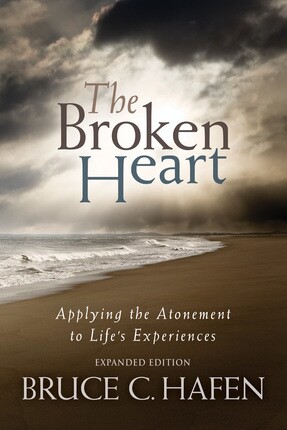There are many kinds of pain associated with learning what God would have us learn here. There are the growing pains that come from learning through our mistakes. Learning from our own errors requires that we honestly acknowledge them, something that is always painful for those who strive for competence. It is also painful to become as independent as we must be and to learn not to expect others to solve our every problem and meet our every need. It sometimes hurts to be realistic or to wait when patience is required.
The Savior of the world knew all these kinds of pain and many others we cannot comprehend. "Man of sorrows" was his name. (See Isaiah 53:3.) Surely he was "acquainted with grief." Only he was capable of absorbing the mental and spiritual anguish inflicted by Gethsemane. As he himself tells us of that pain: how sore we know not, how exquisite we know not, how hard to bear we know not. (See D&C 19:15-19.) Yet when he elsewhere says, "my joy is full" (3 Nephi 17:20), we are assured that a fulness of joy for one such as he must be richer, fuller, and more exquisite than we may ever know in mortality. There is a natural relationship between our capacity to be taught by pain on the one hand and our capacity to receive joy on the other. That is worth remembering when our own pain seems sore and exquisite. (See Alma 36:21.)
There is one other kind of pain of the heart that is familiar to most of us. We call it homesickness. If we feel a little homesick when we are away from home, that is probably a good sign—both about our home and our priorities. Of course, a serious, long-lasting case is probably not healthy for young adults who are gradually being weaned and prepared to build homes of their own. But I mention the idea of homesickness for a larger purpose.
I was once a stake visitor in a sacrament meeting where a member of a temple presidency was talking thoughtfully about the temple. Just before his talk the choir had sung "O My Father." As he was about to finish, I received a message inviting me to say a few words before the meeting closed. I began reflecting about the temple, asking myself what it really meant to me. I found myself thinking of it in these terms: the temple—a symbol that we are not of this world; a place where earth and heaven meet; a place where homesick children think of home.
The singing of "O My Father" had also stimulated my memory to recall, for some reason, an evening in the home of a warm, bright, and sensitive woman in Germany. As missionaries, we had gone to her home for a peaceful few minutes of refreshment and conversation with her family following their baptism. Because she spoke fluent English, she had added some Tabernacle Choir records to her collection during her investigation of the Church. The records were playing in the background as we sat together and talked about our blessings. When the choir began to sing a beautiful, moving arrangement of "O My Father," we stopped visiting and sat back to listen to the hymn. When it was over, we were all a little misty-eyed.
Then she told us in quiet, reverent tones that listening to this song had been a major turning point in her prayerful quest to receive the restored gospel. She told us about the German word Sehnsucht, a poignant, meaningful word that has no exact equivalent in English. I suppose the closest translation would be "a longing for home," but the German word has elements of both longing and searching. She told us that during most of her life she had felt a strange longing for home—a Sehnsucht—that had often made her melancholy and at times a little lonely; but she had never been able to identify that for which she longed. She had been impressed with the occasional references to such a feeling in the writings of some European authors, who thought the Sehnsucht might have something to do with an innate, almost subconscious human yearning to make contact with the essence of nature and meaning in a universal, cosmic sense.
The first time she heard the choir sing this song, she instinctively knew what her longing was and where it came from: "Yet ofttimes a secret something whispered, 'You're a stranger here,' And I felt that I had wandered from a more exalted sphere. . . . But, until the key of knowledge was restored, I knew not why." Then, "When I leave this frail existence, . . . Father, Mother, may I meet you. . . ." 2 As she described it, I too felt the Sehnsucht and knew where it came from.
After relating this story, I shared an agonizing experience I had had that same afternoon interviewing a young couple who wanted to be married in the temple but who were no longer worthy to enter that holy place. As I tried to describe how those two people felt about wanting, in a sense, to go "home" but not being able to go there until completing an arduous repentance process, I found myself thinking about my own longing for home. The almost overpowering thoughts came to me: What if I were unworthy? What if I could never return? What if, after having to turn away my head in shame from that eternal home, I were once again to hear the words, "Father, Mother, may I meet you . . . ?" I really don't think I could stand it. I would spend eternity trying to find some way of shutting off the pain of a longing that could not be fulfilled. Thank heaven—literally—for the Atonement, which promises that, at least on this side of the veil, such exquisite pain need not be permanent.
I will long remember both the words and the feeling expressed by the young man who said the closing prayer in that sacrament meeting: "Please help us, Father. We want to come home."
My present sense of the Sehnsucht, as poignant and piercing as it can be, has become the source of my deepest possible motivation. It reminds me that everything but the gospel is temporary. That kind of pain, that kind of homesickness, is a feeling I never want to lose. If I lose it through my rationalizing, through my behavior, or through my treating lightly the things of God, I know that when the great and dreadful day comes when all our knees will bow together, that very pain will return with full-blown and everlasting intensity.
So I want to remain vulnerable to those painful realities that inevitably come with facing the truth, with learning, with growing, and with loving. Pain of that kind helps me remember that I am in contact with life as it was meant to be experienced, thus preparing me more fully for that appointed reunion with those who sent me here—when, at last, my joy may be full.
This book considers the role of the Lord's saving grace in the mortal experience. Comprising collected essays, Bruce Hafen writes of the important doctrine of the Atonement. A bestseller in hardback, The Broken Heartwill encourage, uplift, and inspire.



